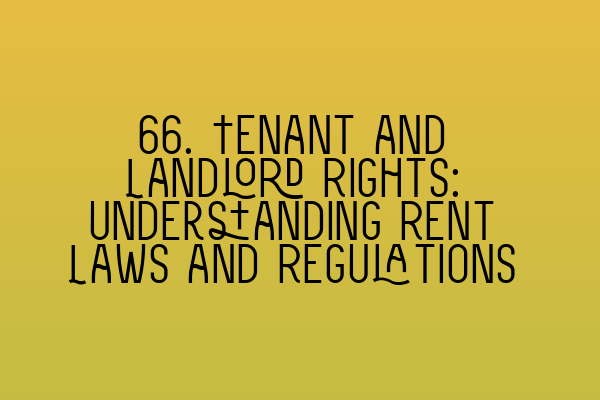\
66. Tenant and Landlord Rights: Understanding Rent Laws and Regulations
Welcome to SQE Property Law & Land Law’s blog! In this post, we will discuss the important topic of rent laws and regulations, specifically focusing on tenant and landlord rights. Understanding these laws is essential for both tenants and landlords to ensure a fair and lawful renting process. So, let’s dive in!
Tenant Rights
Tenants have specific rights that protect them from unfair practices and ensure a safe and habitable living environment. It is important to be aware of these rights to assert them when necessary:
- Right to quiet enjoyment: Tenants have the right to peacefully enjoy their rented property without interference from the landlord or other tenants. This includes the right to privacy and freedom from harassment.
- Right to a habitable property: Landlords are responsible for maintaining the rental property in a habitable condition. This includes providing necessary repairs, maintaining essential services (such as plumbing and heating), and complying with health and safety standards.
- Right to proper notice: Before making any changes to the tenancy, such as increasing rent or terminating the lease, landlords must provide proper notice to tenants as required by local laws.
- Right to fair treatment: Landlords cannot discriminate against tenants based on their race, sex, religion, disability, or other protected characteristics. Fair housing laws exist to ensure equal treatment for all tenants.
- Right to withhold rent: In some cases, tenants may be entitled to withhold rent if the landlord fails to fulfill their duties, such as necessary repairs or maintaining essential services. However, it is important to follow the proper legal procedures to avoid negative consequences.
Understanding and asserting these rights is crucial for tenants to ensure a safe, fair, and comfortable living environment. If you believe your rights as a tenant have been violated, it is advisable to seek legal advice from qualified professionals, such as the team at SQE Property Law & Land Law.
Landlord Rights
While tenant rights are crucial, it is also essential to understand the rights of landlords. Landlords have rights that allow them to protect their property and maintain a profitable and sustainable rental business. Here are some key landlord rights:
- Right to receive rent: Landlords have the right to collect rent from tenants as agreed upon in the lease agreement. Failure to pay rent is a violation of the lease agreement and may lead to eviction.
- Right to proper use of the property: Landlords can restrict certain activities on their property, such as subletting without permission, to ensure the property is being used in accordance with the lease agreement.
- Right to reasonable access: Landlords have the right to enter the rental property to inspect, make necessary repairs, or show the property to potential tenants. However, they must provide proper notice and respect the tenant’s right to privacy.
- Right to recover possession: When a lease ends or if the tenant violates the terms of the lease agreement, landlords have the right to regain possession of the property through legal means, such as eviction.
Landlords must also operate within the bounds of the law and respect tenant rights. If you are a landlord, it is crucial to familiarize yourself with local rent laws and regulations to ensure you are acting in accordance with the law.
Rent Laws and Regulations
Rent laws and regulations vary between jurisdictions, so it is important to understand the specific laws that apply to your situation. Some common aspects of rent laws and regulations include:
- Rent control: In some areas, rent control laws limit the amount landlords can increase rent, protecting tenants from excessively high rent hikes.
- Security deposits: Laws govern how landlords can handle security deposits, such as the maximum amount that can be collected and the rules for returning the deposit at the end of the tenancy.
- Lease agreements: Rent laws specify what should be included in a lease agreement and regulate the terms and conditions, such as the length of the lease, rent payment terms, and responsibilities of both parties.
- Eviction procedures: Regulations outline the process and grounds for eviction, ensuring that tenants are not unlawfully forced out of their homes.
It is crucial for both tenants and landlords to familiarize themselves with the rent laws and regulations applicable to their jurisdiction. This knowledge can help prevent misunderstandings, disputes, and legal issues in the future.
For further study, you may find the following articles helpful:
- SQE 1 Practice Exam Questions
- SQE 1 Practice Mocks FLK1 FLK2
- SQE 2 Preparation Courses
- SQE 1 Preparation Courses
- SRA SQE Exam Dates
Remember, understanding tenant and landlord rights is essential for both parties to ensure a fair and lawful renting process. If you have any specific questions or concerns about your rights as a tenant or landlord, do not hesitate to consult with a professional solicitor specializing in property law.
Thank you for reading!
